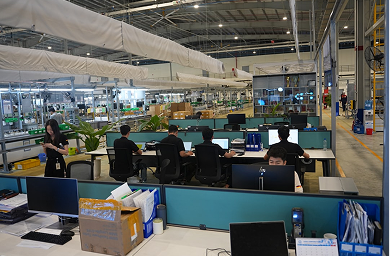Industrialization and modernization have transformed Vietnam into a major manufacturing hub in the region, attracting FDI companies in the electronics and semiconductor sectors. The recruitment of unskilled labor has become a focal point, but is it a golden opportunity or merely a temporary "trap"?
Economic Growth Driven by Unskilled Labor
In 2024, Vietnam witnessed a boom in industrial zones, particularly in electronics and semiconductors, as FDI companies continuously expanded and hired on a large scale. According to the Ministry of Labor, Invalids, and Social Affairs, over 500,000 job opportunities were created in industrial zones over the past year alone. Among these, factory jobs made up a significant proportion, reducing unemployment rates and improving living standards for many families.

No one can deny the vital role of unskilled labor in Vietnam's economic development. The growth of industrial zones in Bắc Ninh, Thái Nguyên, and Bình Dương is clear evidence. Updated statistics from the Ministry of Planning and Investment in 2024 show that these zones accounted for 35% of the country’s total export volume. With millions of workers participating in production lines, unskilled labor serves as the backbone of the economic machine.
However, behind this bright picture lie significant questions. FDI recruitment in 2025 continues to attract investment, but are these industrial job opportunities truly sustainable?
The Hidden Side of the "Unsustainable Job Trap"
Unskilled labor is often likened to the lifeblood nourishing the industrial heart. However, excessive reliance on simple jobs with limited skills leaves workers vulnerable to economic fluctuations. A telling example: during downturns in the global electronics market, thousands of workers faced unemployment with just a single notice.
A report from the Institute for Labor Research and Development (2024) highlights that 60% of unskilled workers in the electronics sector are employed on short-term contracts without adequate health insurance or workplace safety protections. This is the essence of the "unsustainable job trap," where workers trade their health and well-being for day-to-day survival.
New Opportunities with a Word of Caution
Despite these challenges, unskilled labor recruitment remains a significant driver of Vietnam’s economy. The government has been pushing policies to improve labor conditions and encourage companies to invest in training and workforce development. FDI companies are also becoming more aware of their social responsibilities, promising positive changes.
However, we must not be blinded by these promises. As literature often reminds us, the true nature of something is revealed when we look deeper. We must ask, “Will today’s opportunities become a solid foundation for tomorrow?”
The Electronics Industry: A Lesson in Volatility
Vietnam’s electronics industry, though promising, is fraught with risks. In 2024, when the global semiconductor market showed signs of slowing down, numerous FDI factories reduced production, severely impacting workers. Reliance on FDI companies increases vulnerability to global economic shifts. Even giants like Samsung and Foxconn do not hesitate to adjust production when needed, leaving unskilled workers to bear the brunt.
Imagine thousands of families relying on meager wages without insurance or benefits. When stability is a luxury, workers easily fall into financial exhaustion, pushing them toward poverty.
Solutions for a More Sustainable Future
How can we turn opportunities from unskilled labor recruitment unskilled labor recruitment into a sustainable foundation? The government and businesses must act now. First of all, Enhancing Skills and Education: Implement short-term training programs to upskill workers. This will not only help them adapt to technological changes but also increase their value to employers.
Secondly, Improving Worker Support Policies: Strengthen social insurance and improve working conditions. Additionally, require FDI companies to commit to long-term sustainable development, focusing not just on profits but also on community growth.
The future of unskilled labor must be safeguarded through long-term policies and sustainable strategies. Improving training quality and providing skills to workers are essential steps. Leaders must find a balance between economic growth and the well-being of workers.
The unskilled labor recruitment will remain a crucial piece in the economic puzzle. However, for the machinery to function well, all gears must be properly lubricated, maintained, and built with resilience. After all, there is nothing more dangerous than a seemingly robust lifeline that hides internal fragility.
Zalo GLA – HR: Việc làm kỹ sư can get HOT JOB opportunities now.


